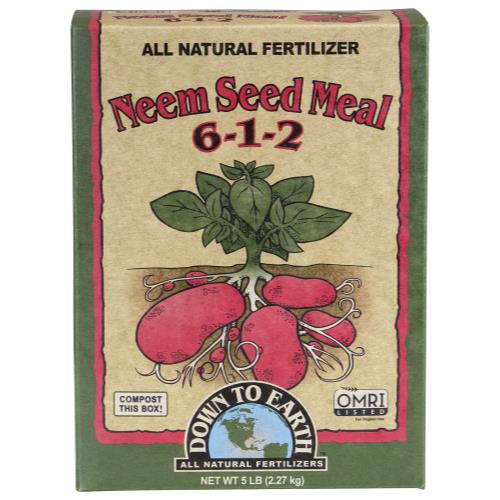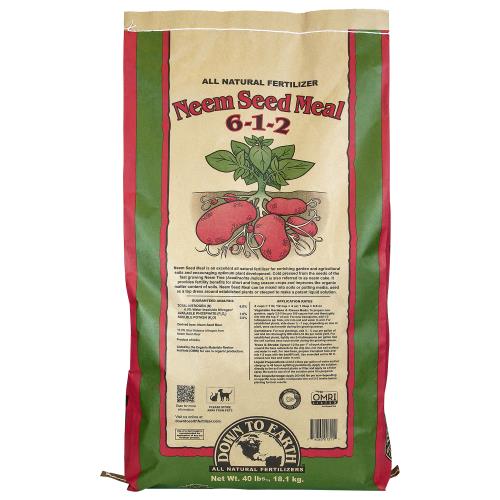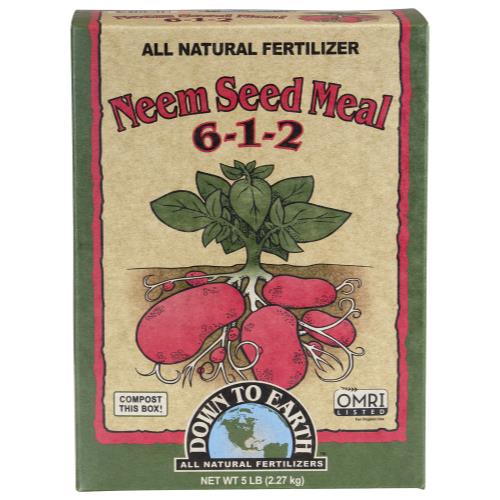Down To Earth
Down To Earth Neem Seed Meal
Down To Earth Neem Seed Meal
20 in stock
Couldn't load pickup availability
Payment options
- Fast Delivery
- Easy Returns
- Secure Checkout
Description
Description
Down To Earth Neem Seed Meal is an all-natural and organic fertilizer and soil conditioner made from the crushed seeds of the neem tree (Azadirachta indica). Neem seed meal is renowned for its exceptional plant-enhancing properties, including acting as a powerful soil conditioner and a source of vital nutrients. It offers a multitude of benefits for gardeners, promoting healthier plants and improved soil structure while serving as an eco-friendly gardening solution.
Key Features:
1. Organic and Sustainable: Neem seed meal is derived from the seeds of the neem tree, a native tree of India. It is an eco-friendly and sustainable choice for organic gardening.
2. Slow-Release Nutrients: Neem seed meal provides a gradual and consistent release of nutrients to plants. This minimizes the risk of over-fertilization and ensures a steady supply of essential elements.
3. Rich in Nutrients: This product is a valuable source of plant macronutrients, including nitrogen and phosphorus, and micronutrients such as zinc and manganese.
4. Natural Pest Control: Neem seed meal has natural pest-repelling properties and can deter various soil-dwelling pests, nematodes, and insects. It serves as a preventative measure against pest infestations.
5. Soil Enhancement: Regular use of neem seed meal improves soil structure, enhances water retention, and increases microbial activity in the soil, ultimately creating a healthier growing environment.
6. Multi-Purpose: Neem seed meal is suitable for a wide range of plants, including vegetables, herbs, flowers, fruit trees, and ornamentals.
Benefits:
• Nutrient Supply: Neem seed meal provides a balanced nutrient profile, promoting overall plant health, strong root development, and improved growth.
• Pest Resistance: It acts as a natural pest repellent, making it less likely for soil-borne pests to damage your plants.
• Improved Soil: Neem seed meal enhances soil texture, aiding in moisture retention and nutrient availability, ultimately supporting healthy plant growth.
• Environmentally Friendly: As an organic gardening solution, neem seed meal is safe for beneficial insects and won’t harm the environment.
Applications:
Down To Earth Neem Seed Meal is versatile and can be used in various gardening applications, including:
• Vegetable Gardens: Apply neem seed meal to vegetable beds to boost the growth of a wide range of crops.
• Flower Beds: Use it for flowering plants, ornamentals, and perennial beds to encourage lush growth and vibrant blooms.
• Fruit Trees: Improve the health and vigor of fruit-bearing trees such as apple, peach, and citrus.
• Herbs: Enhance the growth of herbs like basil, rosemary, and oregano.
• Container Plants: Incorporate neem seed meal into container gardens to provide essential nutrients to potted plants.
Usage Instructions:
• Pre-Planting: Incorporate neem seed meal into the soil before planting by mixing 1-2 pounds per 100 square feet.
• Established Plants: For established plants, apply 1-2 tablespoons around the base of the plant and gently work it into the soil.
• Frequency: Apply neem seed meal every 4-6 weeks during the growing season, which is typically from spring to early fall.
• Watering: After application, water the area to help the neem seed meal’s nutrients reach the plant roots.
• Soil Testing: For precise application rates, consider conducting a soil test to determine your soil’s specific nutrient needs.
Down To Earth Neem Seed Meal is a valuable addition to any gardener’s toolkit, providing a dual-purpose solution of supplying essential nutrients to plants and promoting soil health. Its natural pest-repelling properties make it a particularly appealing choice for those looking to manage pests in an environmentally conscious manner.
Share


INFORMATION QUESTIONS
FREQUENTLY ASKED QUESTIONS
What is Hydroponics?
Hydroponics is the science of growing plants without soil. The plants thrive on the nutrient-water solution alone. The growing medium merely acts as a support for the plants and their root systems while the solution passes freely. The growing medium, if any, is totally inert.
What types of plants grow best hydroponically?
Anything can be grown hydroponically, but some plants prove to be more space efficient. Some plants we suggest are tomatoes, sweet peppers, hot chilies, lettuce, spinach, squash, cucumbers, broccoli, beans, snow peas, herbs and flowers of all types.
Can you REALLY get better yields/quicker growth?
Absolutely. The plants, when receiving everything they need, tend to be healthier, faster growing and generally more productive. You can expect 30% faster growth with many crops.
What are the watering cycle timelines hydroponic systems?
Once the reservoir is filled with nutrients, it is time to put your hydro system to work! The ease of hydroponics is automation – automation is achieved by putting the pump on a timer according to your watering needs. The watering cycle depends on growth stage, growing medium and hydroponic system. In an ebb and flow or drip system with rockwool as the medium, seedlings, clones and plants in the early vegetative stage require watering only once a day for 15-30 minutes (twice a day for higher temps). Mature, flowering and fruiting plants require a heavier feed and can be fed once a day for 30 minutes (twice a day for higher temps). Typically soiless mixes and coco fiber can be watered for about 15 minutes twice a day, and can be adjusted for heavier feeding during the flowering and fruiting stage or higher temps. ViaStone, Hydroton, Grow Rocks, and Silicate mediums need to be watered more frequently – a constant drip for drip systems, and about 15-30 minutes every 3 hours for ebb and flow systems and can be adjusted for heavier feeding during the flowering and fruiting stage or higher temps. Aeroponic systems require frequent watering cycles; 30-60 seconds every few minutes or a constant spray.
What do I need to test pH? How do I test pH?
pH has a range from 0 (acidic) – 14 (alkaline), with 7 being neutral. A proper hydroponic pH range is between 5.5 to 6.2 for most hydroponic crops. For specific crop pH, check out our Plant Guide. pH must remain within the proper range for good plant health, disease resistance, and proper nutrient uptake. pH is maintained by adding pH Up and pH Down to the nutrient solution. For more information, see the Testssection of our site.
How will the flavor compare to my outdoor grown, organic produce?
The taste may be even better! This is simply due to the fact that the hydroponically grown plants are getting everything they need, when they need it. Don’t be fooled by “hot house” produce grown commercially. The grower’s primary concern is shipability and storage, not flavor. When you grow your own vegetables at home, you can expect nothing less than excellent results. Plus, hydroponically grown produce has the added benefit of a longer shelf life.

